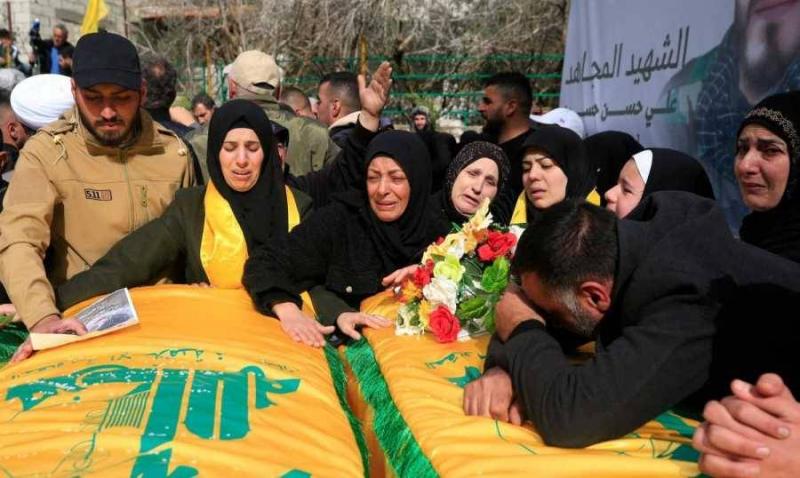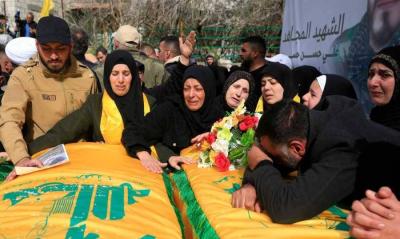Hezbollah Secretary-General Hassan Nasrallah appeared defensive in the face of criticism surrounding his involvement in dragging Lebanon into war, approximately six months after the onset of hostilities in the south between the party and Israel. Notably, in addition to reiterating the connection between the southern front and Gaza, Nasrallah spoke about the significant repercussions of the war on Tel Aviv from the northern region, while simultaneously minimizing the impact of the conflict on southerners and Lebanese in general.
During a Ramadan Quranic evening event, Nasrallah stated, "Our Lebanese front will remain in a supportive position alongside the resistance of the people of Gaza and the leadership of Hamas, regardless of the time." He affirmed, "Our Lebanese front is fulfilling its duty and role fully in this battle, and the cries of settlers rise from resistance operations, with a high degree of secrecy around the casualties, vehicles, dead, and injured. The Israeli army today is exhausted and worn out on all fronts, and the number of its dead is much larger than reported, rendering it unable to launch a war on the northern front."
In response to his critics, he remarked, "Anyone wishing to assess what the resistance is doing on the Lebanese front must see how it has deterred the enemy from waging war on Lebanon. This requires some time, and signs of exhaustion have begun to show in this enemy's society, with its army and economy also in a state of fatigue."
Researcher and university professor Makram Rabah considered Nasrallah's statements to reflect "the specific reading of the resistance axis regarding events on the Israeli front, particularly interpreting that even if all Palestinians die and Hamas remains, it signifies that the axis is still strong." Rabah told Asharq Al-Awsat, "Nasrallah still insists on linking the fronts despite the clarity of U.S. envoy Amos Hochstein about a complete separation between the two fronts, in addition to his attempts to obscure losses in the south and the suffering of the residents." He added, "Nasrallah's repeated claims that the people of the south can endure are inaccurate, as is his blame of the Lebanese state for not standing by them or abandoning them."
On his part, Charles Jabbour, the media and communications official for the Lebanese Forces, noted that Nasrallah consistently appears defensive in his speeches amidst the campaign against him in Lebanon and the rejection of dragging the country into war, even as everyone stands by the rights of the Palestinian people. Jabbour told Asharq Al-Awsat, "Nasrallah has come forth to assert three main issues, the first being to justify that his entry into the war served Hamas, responding to Lebanese who see that opening the front has provided nothing for the Palestinians, attempting to claim he has given a lot to Gaza; however, this theory is flawed because had he done something significant, Israel would have halted the war or reduced the pressure or attack on Gaza, which did not happen."
Jabbour also pointed out Nasrallah's stubborn adherence to a position contrary to the desire of most Lebanese, maintaining the principle of unified front lines by keeping the front open as long as Gaza's front is open, thus affirming once again that he unilaterally decides on war and peace, and that Lebanon is a hostage state with Hezbollah acting against the desires of Lebanon and the Lebanese.
Jabbour commented on Nasrallah's remarks regarding the losses sustained by Israel in comparison to those in Lebanon, saying, "He attempts to minimize the ramifications of the war, asserting that Israel's losses are greater. We are not concerned with what happens in Israel, but rather in Lebanon, and attempting to downplay the disaster does not mean it is not occurring; the evidence for this is the economic and commercial losses estimated in millions of dollars, the destruction and damage to thousands of houses, and the displacement of tens of thousands."
While Lebanese factions, especially those opposing Hezbollah, reject dragging the country into war and his monopolization of the decision of war and peace, the support of most southern residents for Hezbollah does not equate to their endorsement of war, as confirmed by an anonymous southern resident. He clarified to Asharq Al-Awsat, "The idea that the people of the south support the war is entirely incorrect and unrealistic; what some say on social media does not necessarily reflect the reality on the ground. Those who have been significantly harmed by the war, displaced from their homes, and lost their homes and livelihoods do not support the war but have no other option but to support Hezbollah in the absence of the state and while awaiting assistance, whether directly from him or through him, in addition to the lack of any visible prospect or price for what they are paying."
Nasrallah had pointed out that a vital part of Israel's economy in the northern region has been significantly affected by the war, remarking that losses in southern Lebanon cannot be compared to those in the northern region, where political, commercial, and economic institutions exist. In contrast, in the south, losses are limited due to the absence of such a number of institutions.
Lebanon’s economic losses are estimated between $7 and $10 billion, as stated by Minister of Economy Amin Salam, while agricultural sector losses were estimated at $2.5 billion. Agriculture Minister Abbas Al-Haj Hassan announced the destruction of tens of thousands of agricultural dunams due to Israeli phosphorus bombing, as well as around 5,000 olive trees.
Around 1,000 homes have been reported destroyed so far, as stated by Interior Minister Bassam Mawlawi, with approximately 5,000 homes damaged, and over 90,000 people displaced from southern towns.
In response to this comparison, Lebanese Forces MP Fadi Karam wrote on X platform, "Lebanon, like all its regions, including the south, was more qualified than others in the Middle East to be full of institutions, tourists, agricultural, industrial companies, etc., if it hadn't been transformed since the 1970s from a resistance axis to a scene of destruction. Has your slogan now become: Our strength lies in our backwardness?"
Similarly, Lebanese Kataeb MP Nadim Gemayel responded to Nasrallah's remarks, writing on X, "Hezbollah's notion of preemptive wars has proven to be a failure since the Syrian war, causing crises, displacements, and crimes in Lebanon. Today, the supposed front of support that Nasrallah promotes brings nothing but calamities and destruction to Lebanon. Furthermore, Hezbollah does not protect or defend Lebanon. What is happening in Gaza, with destruction, tragedy, and hunger, is not a victory for Palestinians. What is occurring in the south and the Bekaa is neither defense nor support nor victory." He affirmed, "There is no salvation for Lebanon before the disarmament of all militias and the implementation of international resolutions, foremost among them Resolution 1559."




